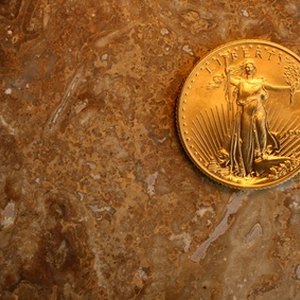
Gold as an investment has become increasingly popular as prices have risen well over $1,000 per ounce. While owning gold bullion was once illegal in the United States, today the yellow metal is considered one of the best investments to protect against inflation and the weakening of the U.S. currency. Gold's growing popularity has triggered changes in how sales will be reported to the Internal Revenue Service (IRS).
Capital Gains
For most individuals, the sale of gold coins is reported on Form 8949 and Schedule D of IRS Form 1040, along with other capital gains and losses. The cost basis of the coins used to calculate a gain or loss can be determined in the same ways as the cost basis in stocks. Similarly, whether a sale of gold coins is a long- or short-term capital gain or loss is governed by the same rules, which are based on whether the seller owned the asset for at least a year. As with other capital losses, losses on sales of gold coins can be used to offset other gains.
Business Income
If you are in the business of selling gold, you must report gains as ordinary business income. The IRS uses a variety of factors to determine whether an activity is merely a hobby or a business. Generally, a sole proprietorship reports business income on the individual business owner’s tax return on Schedule C of Form 1040. Other types of business entities can include the proceeds of gold coin sales as ordinary revenue.
1099-B
As of 2010, sales of gold bullion did not need to be reported on a Form 1099-B unless they conform with Commodity Futures Trading Commission (CFTC) futures contract specifications, which include requirements for quantity, purity and weight. Under the rules for 1099-B, though, sales in a 24-hour period must be aggregated to determine whether they fit the CFTC requirements. Exchanges of bullion for other goods or services also need not be reported unless they are made on a qualifying barter exchange.
Changes in the Law
The health care reform act signed by President Obama in 2010 includes a provision that will change the way gold bullion dealers operate. Effective for the 2012 tax year, any purchase of gold bullion over $600 by a dealer will have to be reported on Form 1099-B. According to ABC News, this change in the law will vastly increase the number of 1099s that must be required and will provide the federal government with much more detailed information about dealer purchases of bullion.
References
- Internal Revenue Service: Publication 544
- Internal Revenue Service: 1099-B Instructions
- Internal Revenue Service: Business Income
- ABC News: Gold Coin Sellers Angered by New Tax Law
- Gold Ira Guide.org. "Credit Suisse Gold Bars." Accessed June 10, 2020.
- United States Gold Bureau. "How Much Does a Gold Bar Weigh? Find Answers About Gold Bar Size and Weight." Accessed June 10, 2020.
- Market Watch. "Opinion: 'There is no gold': Bullion dealers sell out amid panic buying." Accessed June 10, 2020.
- ETF. "Gold ETF Overview." Accessed June 10, 2020.
- World Gold Council.org. "Gold facts." Accessed June 10, 2020.
Writer Bio
Joseph Nicholson is an independent analyst whose publishing achievements include a cover feature for "Futures Magazine" and a recurring column in the monthly newsletter of a private mint. He received a Bachelor of Arts in English from the University of Florida and is currently attending law school in San Francisco.

